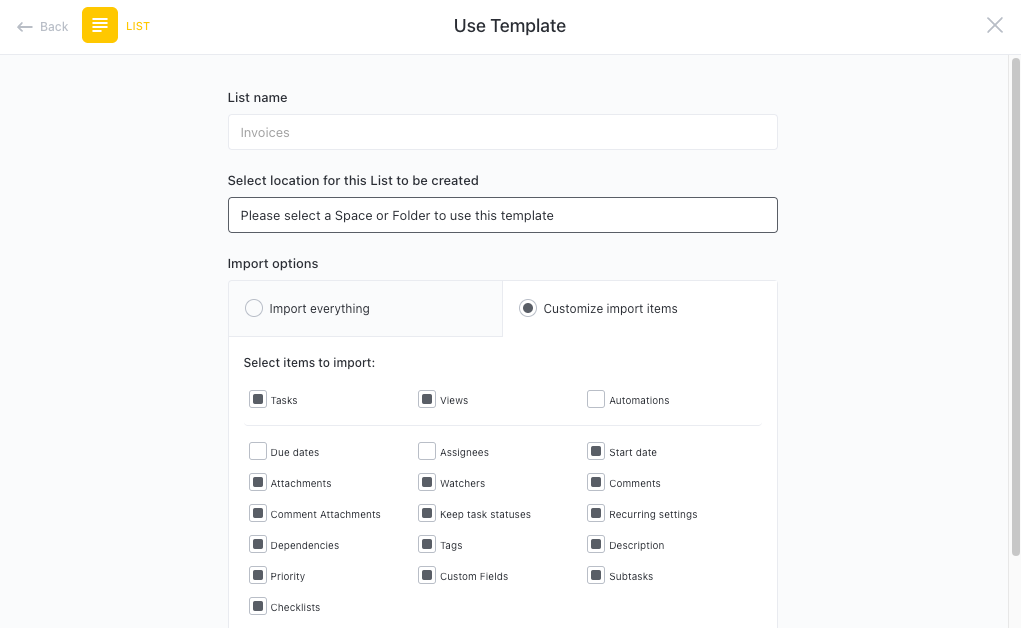Gathering your team for a debrief meeting is essential for project success. But creating an effective agenda can be time-consuming and overwhelming. That's where ClickUp's Debrief Meeting Agenda Template comes to the rescue!
With ClickUp's Debrief Meeting Agenda Template, you can:
- Easily structure your debrief meetings with a pre-built agenda
- Gather valuable feedback and insights from your team
- Discuss project outcomes and identify lessons learned
- Develop action plans to improve future project performance
Don't waste time reinventing the wheel for every debrief meeting. Use ClickUp's Debrief Meeting Agenda Template to streamline your process and make every meeting count!
Benefits of Debrief Meeting Agenda Template
Running a successful debrief meeting is crucial for continuous improvement and project success. By using the Debrief Meeting Agenda Template, you can:
- Ensure all key project stakeholders are present and engaged
- Facilitate open and honest discussions about project outcomes and performance
- Identify lessons learned and best practices to be applied in future projects
- Develop action plans to address any issues or gaps discovered during the debrief
- Foster a culture of learning and growth within your team or organization
Main Elements of Debrief Meeting Agenda Template
ClickUp's Debrief Meeting Agenda Template is the perfect tool to ensure productive and efficient meetings!
Here are the main elements of this Doc template:
- Custom Statuses: Use custom statuses to track the progress of your meeting agenda items, such as To Do, In Progress, and Completed, ensuring that everyone is on the same page during the meeting and action items are addressed.
- Custom Fields: Customize the template with specific fields that are relevant to your debrief meetings, such as Meeting Date, Attendees, Action Items, and Discussion Points, making it easy to capture and organize important information.
- Collaborative Editing: With ClickUp's collaborative editing feature, multiple team members can simultaneously contribute to the meeting agenda in real-time, promoting collaboration and efficiency.
- Actionable Checklist: Create a checklist within the agenda to track action items and assign responsibilities to team members, ensuring that all tasks are followed up on after the meeting.
- Different Views: Access the meeting agenda in various views, such as Table view for a structured overview, Doc view for detailed documentation, and Board view for a visual representation of the agenda items.
With ClickUp's Debrief Meeting Agenda Template, you can streamline your meetings and drive actionable results.
How to Use Meeting Agenda for Debrief Meeting
To make your debrief meetings more effective and productive, follow these six steps using the Debrief Meeting Agenda Template in ClickUp:
1. Set the meeting objective
Before the meeting, determine the purpose and objective of the debrief. Are you reviewing a project, discussing a recent event, or analyzing a campaign? Clearly define what you want to achieve in the meeting to ensure everyone is on the same page.
Use the Goals feature in ClickUp to set the objective for the debrief meeting.
2. Prepare the agenda
Create an agenda that outlines the topics and questions that need to be discussed during the debrief. Include a brief overview of the project or event, key metrics or results to analyze, and any specific areas of focus. This will help keep the meeting focused and ensure nothing important is overlooked.
Use the Board view in ClickUp to create a visual agenda with different columns for each topic or question.
3. Gather relevant data
Collect all the necessary data and information that will be needed during the debrief. This may include reports, analytics, feedback from stakeholders, or performance metrics. Make sure everyone has access to the data before the meeting so they can come prepared.
Use the Docs feature in ClickUp to compile and share all the relevant data and information with the team.
4. Assign roles and responsibilities
Assign specific roles and responsibilities to team members for the debrief meeting. This can include a facilitator to keep the discussion on track, a note-taker to document key points, and presenters to share insights or findings. Clearly communicate these roles to everyone involved to ensure a smooth and efficient meeting.
Use the Automations feature in ClickUp to automatically assign roles and responsibilities to team members based on their expertise and availability.
5. Conduct the debrief meeting
During the meeting, follow the agenda and encourage open and honest discussion. Allow everyone to share their thoughts, insights, and feedback related to the project or event being debriefed. Take notes of key points and decisions made during the meeting for future reference.
Use the Calendar view in ClickUp to schedule and conduct the debrief meeting, ensuring that all participants are available at the designated time.
6. Follow up and take action
After the debrief meeting, it's important to follow up on any action items or decisions made during the meeting. Assign tasks to team members to implement any necessary changes or improvements identified during the debrief. Regularly check in on the progress of these tasks to ensure they are completed.
Use the Tasks feature in ClickUp to assign and track action items resulting from the debrief meeting. Set due dates and reminders to keep everyone accountable.
By following these steps and using the Debrief Meeting Agenda Template in ClickUp, you can conduct more effective debrief meetings that lead to actionable insights and improvements.

Get Started with ClickUp’s Debrief Meeting Agenda Template
Project managers or team leaders can use the Debrief Meeting Agenda Template to effectively conduct debrief meetings and gather feedback to improve future project performance.
First, hit “Add Template” to sign up for ClickUp and add the template to your Workspace. Make sure you designate which Space or location in your Workspace you’d like this template applied.
Next, invite relevant team members or stakeholders to your Workspace to start collaborating.
Now you can take advantage of the full potential of this template to conduct productive debrief meetings:
- Use the Discussion View to facilitate open and constructive discussions about the project outcomes
- The Action Items View will help you capture and assign action items to team members for implementation
- Use the Lessons Learned View to identify key takeaways and ensure they are incorporated into future projects
- The Timeline View will provide a visual representation of the project timeline and milestones
- Assign tasks to team members and set due dates to ensure accountability and progress tracking
- Use the Notes section to document important discussions and decisions made during the meeting
- Collaborate with stakeholders to develop an action plan for improving future project performance








